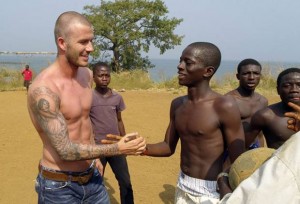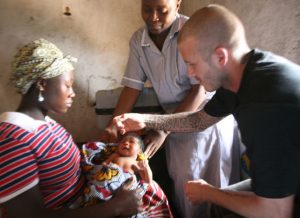
Celebrity activists are not limited to Hollywood stars but are also found among famous politicians such as Tony Blair and premier athletes such as David Beckham. In the case of the former Prime Minister of the UK, Tony Blair’s office is heavily involved in the capacity building efforts of Sierra Leone in various sectors through his African Governance Initiative.

Others complain that the few major celebrities, such as Idris Elba, who are of Sierra Leone descent do not even acknowledge their country of heritage let alone contribute in some way to its advancement. Elba, whose father is Sierra Leonean and mother is Ghanaian, has never travelled to Sierra Leone or Ghana but has expressed an interest in getting to know his roots. In May, 2011, Elba made a surprise appearance at the official 50th Independence Anniversary Celebration organized by the Embassy of Sierra Leone in the US and the Jubilee Independence Committee headed by David Vandy, a longstanding radio show host at Voice of America. In a later press statement, Elba emphasized his desire to build a clinic and movie studio in Sierra Leone. Another name that has been making the rounds lately is a rising star, Sahr Ngauja, the lead of the popular Broadway hit, Fela. Though Ngauja had never traveled to Sierra Leone by the time he rose to fame, he has since traveled back and forth on several occasions, establishing links with family and laying the foundation for development projects in the near future.
So, what about some of these real celebrity activists, the honest do-gooders who, like Beckham, aspire to use their success and fame to draw the world’s attention to the plight of those who are less fortunate or to advance a cause or issue of social justice that they feel particularly passionate about? Is there really a problem with celebrities choosing to promote their own careers through aligning themselves publically with a specific problem that affects them personally?
In fact, it appears as if not a few of these do-good celebrities may be motivated by their own experiences of abandonment, violence, rejection, pain or illness and that after achieving success, they can now turn to confront their own demons by openly helping others who face similar struggles and don’t have the stature or exposure that the celebrities enjoy. So, instead of turning to drugs or reality shows to anesthetize their past experiences, some of them reach outside of themselves to connect with others and share in familiar ordeals. And so, in Sierra Leone alone we've had high (and low) profile visits from Rosario Dawson who has openly talked about her past experiences and current commitment to advancing women’s rights in health and sexual matters in different parts of the world, including Sierra Leone. And, more recently, Victoria Secrets supermodel Selita Ebanks has made Sierra Leone an important place to connect with other women, many of whom confront life and death challenges during childbirth, simply because they cannot afford transportation to hospitals for safe deliveries.
For Selita, there was no doubt in her mind what she felt compelled to do after visiting Sierra Leone and learning about high rates of maternal mortality. Through an initial partnership with Shine on Sierra Leone, an NGO founded by Hollywood casting director, filmmaker and humanitarian, Tiffany Persons, Selita was able to get her good industry friend, Russell Simmons, to host a party where he invited several of his well-to-do friends who ended up donating thousands of dollars towards Shine’s maternal health program.
Selita was invited back to Sierra Leone to take part in a ceremony hosted by the First Lady, Madame Sia Nyama Koroma, that launched the maternal health program through her Women's Initiative for Safer Health (WISH) and Wellbody Alliance, a community-based clinic and health organization in Kono District in the eastern part of Sierra Leone. Although Shine is now focusing more exclusively on education activities, the maternal health program has been fully established at Wellbody’s clinic and Selita is now the goodwill ambassador for this program.
As part of the 5th Miss Sierra Leone USA Pageant from June 29 to July 1, 2012, Selita will join forces with Wellbody Alliance, Johns Hopkins Safe Surgery and Anesthesia in Sierra Leone (SASSL) Initiative, Omega Psi Phi and the organizers of MSLUSA to highlight some of the advances in maternal health in Sierra Leone as well as the continued challenges in making deliveries safe for pregnant women. An aspect of this collaboration is to bring to the attention of the Sierra Leone community at home and in the diaspora, the critical role of celebrity activists such as Selita Ebanks in advancing the country’s development goals. We challenge critics and cynics to engage with these individuals, join hands with them and guide them in their efforts as well as their representations of Sierra Leone within the global community.


Be the first to comment